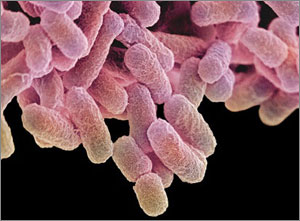Scientists create super-productive bacteria colonies that pump out useful chemicals faster than ever before using "survival of the fittest" tactics

(BOSTON) — A team of researchers led by Harvard geneticist George Church, Ph.D., at the Wyss Institute for Biologically Inspired Engineering and Harvard Medical School has made big strides toward a future in which the predominant chemical factories of the world are colonies of genetically engineered bacteria. In a new study, scientists at the Wyss Institute modified the genes of bacteria in such a way that they can now program exactly what chemical they want the cells to produce through their metabolic processes, and how much of it. The research was reported in the Proceedings of the National Academy of Sciences.
The concept of metabolic engineering, or manipulating bacteria to synthesize useful chemicals, is not brand new to synthetic biologists. But these new findings promise up to a 30-fold increase in chemical output and demonstrate a technique that allows scientists to tap an almost endless list of chemicals that they can choose to produce using any type of bacteria, such as the common E. coli that was used in the study. Most promising, the production timescale is nearly one thousand-fold faster than currently used methods for metabolic engineering.
“This advance has implications for pharmaceutical, biofuel, and renewable chemical production,” said Wyss Institute Founding Director Donald Ingber, M.D., Ph.D., who is also the Judah Folkman Professor of Vascular Biology at Harvard Medical School and Boston Children’s Hospital and Professor of Bioengineering at Harvard School of Engineering and Applied Sciences. “By increasing the production output by such a huge factor, we would not only be improving current chemical production but could also make economical production of many new chemicals attainable.”
The Wyss Institute team has achieved this by using evolutionary mechanisms to trick the bacteria into self-eliminating the cells that are not high-output performers, ridding the entire process of the need for human and technological monitoring to make sure the bacteria are producing efficiently, and therefore hugely reducing the overall timescale of chemical production.
“We make the bacteria addicted to the chemicals we want them to produce,” said Jameson Rogers, a lead co-author of the study, Ph.D. candidate at Harvard School of Engineering and Applied Science and Wyss Institute graduate researcher. “Then, we treat them with an antibiotic that only allows the most productive cells to survive and make it on to the next round of evolution.”
The technique makes a desired chemical product essential to the bacteria’s survival by modifying their DNA so that antibiotic-resistant genes are activated, but only in the presence of a certain chemical, such as the one that is desired for production. At the same time, the genetic modification makes the low-output chemical producers highly susceptible to being killed off by antibiotics. Only the most productive cells generate enough of the desired chemical to be completely resistant to the antibiotic and survive to go onto the next round of evolution. As each evolution cycle progresses, the bacteria become more and more effective at producing the desired chemical as they use the “survival of the fittest” principle to stamp out the weakest producer cells.
“We’re using evolution to select for the cells that only serve our purpose best, making human monitoring less important to that feedback loop and instead relying on the bacteria to self monitor their production performance,” said Church, the study’s senior author, who is a Wyss Institute Core Faculty member, Professor of Genetics at Harvard Medical School and Professor of Health Sciences and Technology at Harvard and MIT. “This is a major direction of growth in synthetic biology, where the focus has mostly been on one-off experiments until this point.”
Additional lead co-authors of the study include Srivatsan Raman, Ph.D., a Wyss Institute Technology Development Fellow and a Genetics Research Fellow at Harvard Medical School, and Noah Taylor, a Ph.D. candidate at Harvard Medical School.